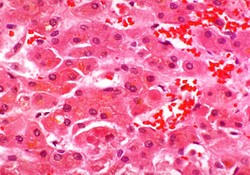Alcoholic hepatitis is an acute inflammatory condition which is, of course, the result of excessive intake of alcohol. Not all who drink will develop this disease; in fact, some binge drinkers may never have it. Like many other medical conditions, it may be mild or severe, and the most advanced cases tend to have have the worst clinical outcome [1, 2].
When this is a severe condition, it can be devastating for the patient. Of those clients who have severe alcoholic hepatitis, a quarter of them will die from it [1]. The major clinical abnormality is decompensation of the liver [1, 2].




 The Reality of Aspirinon 05/24/2021
The Reality of Aspirinon 05/24/2021
 An Old Microbeon 03/31/2021
An Old Microbeon 03/31/2021
 Coronavirus and Mental Illnesson 02/14/2021
Coronavirus and Mental Illnesson 02/14/2021
 Acute Ischemic Strokeon 12/25/2020
Acute Ischemic Strokeon 12/25/2020


Comments